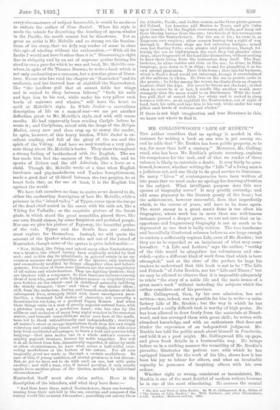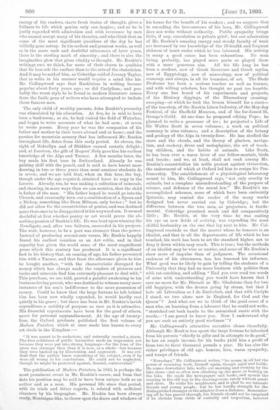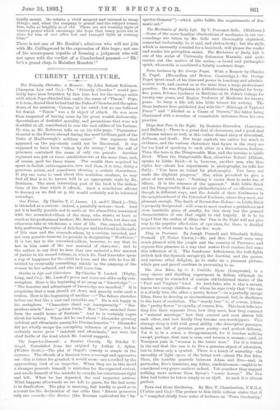MR. COLLINGWOOD'S "LIFE OF RUSKIN." THE author considers that no
apology is needed in this instance for writing a book on one who is yet among us ; and he adds that "Mr. Ruskin has been public property, so to say, for more than half a century." Moreover, Mr. Coiling- wood, who has been Mr. Ruskin'a private secretary, explains his competence for the task, and of that no reader of these volumes is likely to entertain a doubt. It may fairly be ques- tioned, however, whether writing the "Life " of a living man is a judicious act, and one likely to do good service to literature. So many " Lives " of contemporaries have been written of late years that we need make no apology for drawing attention to the subject. What intelligent purpose does this new species of biography serve ? It may gratify curiosity, and add some piquancy to the literary gossip of the hour; but the achievement, however successful, does that imperfectly which, in the course of years, will have to be done again. The worst enemy to a great man's fame is too often his biographer, whose work has in more than one well-known instance proved a deeper grave ; we are not sure that an in- opportune and fragmentary biography is not as much to be deprecated as one that is badly written. The two handsome and beautifully illustrated volumes before us are large enough to contain a sufficiently copious Life, even of Mr. Ruskin ; but they are to be regarded as an instalment of what may come hereafter. "A Life and Letters," says the author, "worthy of the title would be altogether too voluminous and one- sided,—quite a different kind of work from that which is here attempted," and at the close of the preface he begs his readers to understand that this book is not to be "The Life and Friends" of John Ruskin, nor his "Life and Times ;" but we may be allowed to observe that it is impossible adequately to relate "the story of a noble life and the main issues of a great man's work" without including the subjects which the author considers out of his province.
Mr. Collingwood, then, by his own admission, has not written—nor, indeed, was it possible for him to write—a satis- factory Life of Mr. Ruskin ; but the way in which he has performed a really difficult task is worthy of high praise. He has been allowed to draw freely from the materials at Brent- wood, and has arranged them with great skill ; he writes with abundant knowledge, and with an enthusiasm that does not hinder the expression of an independent judgment. Mr. Ruskin has told the public much about himself in Praeterita, and told it as a poet might. Mr. Collingwood fills up gaps, and gives fresh details in a businesslike way. He brings before us in a striking manner the versatility of Mr. Ruskin's pursuits ; illustrates the patient care with which he has equipped himself for the work of his life ; shows how it has been his joy to labour for others, and what an invaluable capacity he possesses of inspiring others with his own ardour.
Whether right or wrong, consistent or inconsistent, Mr. Ruskin is one of the most fruitful of modern writers because he is one, of the most stimulating. He arouses the mental
* The Life and Work of John Ruskin. By W. G. Oollingvond, M.A., Editor of "The Poem, of John Muskin," &e. With Portraits and other Illustrations. 2 vols. London : Methuen and Co, 1893.
energy of his readers, starts fresh trains of thought, gives a fullness to life which genius only can inspire; and so he is justly regarded with admiration and with reverence by men who cannot accept many of his theories, and who think that on some of the most significant questions of the day he has wilfully gone astray. In his earliest and greatest works, as well as in the more rash and doubtful utterances of later years, there is the sterling mark of sincerity ; and. there is also the imaginative glow that gives vitality to thought. Mr. Ruskin's writings owe, we think, far more of their charm to qualities that lie bens ath the surface than to the arts of the rhetorician.
And it may be said of him, as Coleridge said of Jeremy Taylor, that to write in his manner would require a mind like his.
Mr. Collingwood says that Ruskinism in writing became popular about forty years ago ; so did Carlylism; and pro- bably the worst style to be found in modern literature comes from the futile pens of writers who have attempted to imitate these famous men.
The only child of wealthy parents, John Ruskin's precocity was stimulated by his education. At five, be is said to have been a bookworm ; at six, he had visited the field of Waterloo, and began to write accounts of what he had seen ; at seven he wrote poems. Every year he was the companion of his father and mother in their tours abroad and at home; and the passion for mountain scenery that has influenced Mr. Ruskin throughout life, dates from this early period. At eleven, the sight of Helvellyn and of Skiddaw caused ecstatic delight ; and, at fourteen, the gift of Rogers' Italy gave him his earliest knowledge of the Alps and Turner. A few months later, the boy made his first tour in Switzerland. Already he was gaining skill with the pencil, and is said to have learnt more drawing in two or three years than most amateur students do in seven; and we are told that, when on this tour, the boy, though under the age required, obtained leave to copy in the Louvre. Already, too, he was making a collection of minerals, and showing, in more ways than we can mention, that the child is father of the man. "His father hoped he would go into the Church, and eventually turn out a combination of a Byron and a Bishop, something like Dean Milman, only better ; " but he did not allow for the eccentricities of genius, and was destined more than once to be disappointed in his wayward son. It seemed doubtful at first whether poetry or art would prove the ab- sorbing passion of Ruskin's life. He was bent upon winning the Newdigate, and, after two failures, succeeded in his purpose. The wish, however, to be a poet was stronger than the power. Instead of producing second-rate verses, Mr. Ruskin happily found his earliest vocation as an Art critic, and in that capacity has given the world some of the most magnificent prose which this century has produced. It is a significant fact in his history that, on coming of age, his father presented him with a Turner, and that from the allowance given to him he bought another, "with the characteristic disregard for money which has always made the vendors of pictures and books and minerals find him extremely pleasant to deal with." This purchase, we are told, proved a painful awakening to his business-loving parent, who was destined to witness many more instances of his son's indifference to the mere possession of money. Could he know that the large fortune he left behind him has been now wholly expended, he would hardly rest quietly in his grave ; but there has been in Mr. Ruskin's lavish expenditure a nobility of purpose as rare as it is attractive. His financial experiments have been for the good of others, never for personal aggrandisement. At the age of twenty- four, the Oxford graduate published the first volume of Modern Painters, which at once made him known to every art circle in the Kingdom :—
"It was meant to be audacious, and naturally created a storm. The free criticisms of public favourites made an impression not because they were put into strong language—for the tone of the press was stronger then than it is now, as a whole—but because they were backed up by illustration and argument. It was evi- dent that the author knew something of his subject, even if he were all wrong in his conclusions. He could not be neglected, though he might be protested against, decried, controverted."
The publication of Modern Painters, in 1843, is perhaps the most prominent event in Mr. Ruskin's career, and from that date his position may be said to have been unique both as an author and as a man. His personal life since that period, with its trials and bitter regrets, is related with sufficient clearness by his biographer. Mr. Ruskin has been always ready, Montaigne-like, to throw open the doors and windows of his house for the benefit of his readers ; and we suppose that in recording the love-sorrows of his hero, Mr. Collingwood does not write without authority. Public sympathy brings little, if any, consolation to private grief; but our admiration of Mr. Ruskin's amazing energy and steady faculty of work are increased by our knowledge of the ill-health and frequent sickness of heart under which he has laboured. His activity in many a good cause has been exhaustless. No man living, probably, has played more parts or played them with a more generous aim. All his life long he has been a student, now of Greek literature and Greek myths, now of Egyptology, now of mineralogy, now of political economy, and always, in all its branches, of art. The Slade Professor has been a zealous teacher as well as learner, and with willing scholars, has thought no post too humble. Every one has heard of his experiments and projects, of the Hinksey diggings, of the Bloomsbury crossing- sweeping—at which he took the broom himself for a start— of the tea-shop, of the Ruskin Linen Industry, of the May-day Festival, of the Sheffield Museum, and of the far-famed St. George's Guild. At one time he proposed editing Pope ; he planned to write a grammar of ice ; he projected a Life of Sir Walter Scott in seven volumes ; a work on political economy in nine volumes ; and a description of the botany and geology of the Alps in twenty-four. He has studied the stars and the clouds, and the theory of glaciers, naviga- tion, and cookery, dress and metaphysics, the art of teach- ing children, and the habits of animals. Like Scott, he has been ever a warm lover of our fellow-mortals, birds and beasts ; and we, at least, shall not rank among Mr. Ruskin's eccentricities his noble protest against vivisection, the endowment of which at Oxford led him to resign his Pro- fessorship. The establishment of a physiological laboratory
meant to him, Mr. Collingwood says, "not only cruelty to animals, but a complete misunderstanding of the purpose of science, and defiance of the moral law." Mr. Ruskin's =- accomplished schemes, some of which have been eminently
Quixotic, may remind the reader of the many works designed but never carried out by Coleridge; but the difference between the two men, as projectors, is funda- mental. Coleridge promised much and did comparatively little ; Mr. Ruskin, at the very time he was casting
his eye on new fields of activity, was expending the most skilful husbandry on the one that lay next to him. Mr. Col- lingwood reminds us that the master whom he honours is an idealist, and that in all the departments of life which he has touched, his work has been to set the standard higher, not to
drag it down within easy reach. This is true ; but the methods of an idealist may be wise or unwise, and some of Mr. Ruakin's
show more of impulse than of judgment. The occasional rashness of his utterances, too, has lessened his influence. What good was he likely to gain by telling the students of a University that they had no more business with politics than with rat-catching, and adding, "Had you ever read ten words of mine with understanding you would have known that I care no more for Mr. Disraeli or Mr. Gladstone than for two old bagpipes, with the drones going by steam, but that I hate all Liberalism as I do Beelzebub, and that with Carlyle I stand, we two alone now in England, for God and the Queen" P And what are we to think of the good sense of a man who, on learning from a labourer that he could not write, "stretched out both hands to the astonished rustic with the words,—' I am proud to know you. Now I understand why you are such an entirely good workman' "I'
Mr. Collingwood's attractive narrative closes cheerfully. Although Mr. Ruskin has spent the large fortune he inherited from his parents "chiefly in gifts and in attempts to do good,' he has an ample income, for his books yield him a profit of from two to three thousand pounds a year. He has also the richer privileges of old age, honour, love, warm sympathy, and troops of friends.
"Nowadays," Mr. Collingwood writes, "he seems, in all but the power of resuming work, himself again, though aged and feeble. He comes downstairs late, walks out morning and evening by the lake shore—not so often now climbing up the moor, or boating on the lake. He reads the newspapers and books, and spends the evening in the old way in the drawing-room, rarely without music and chess. He visits his neighbours, and is glad to see intimate friends and young people ; but he has hardly strength for the distinguished stranger or the admirer from a distance. Remember- ing all he has passed through, his friends should not be surprised if he shrinks from visits of curiosity and inspection, however
kindly meant. He retains a vivid memory and interest in many things ; and, when the company is genial and the subject rouses him, talks as brightly as of old. There are not wanting signs of reserve power which encourage the hope that many years are in store for him of rest after toil and tranquil light at evening time."
There is not one of Mr. Ruskin's admirers who will not join with Mr. Collingwood in the expression of this hope; not one of his countrymen capable of forming a judgment who will not agree with the verdict of a Cumberland peasant i—" Eh he's a grand chap, is Maisther Rooskin!"




















































 Previous page
Previous page